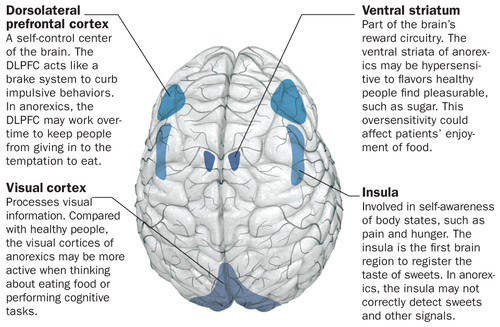Food and Mood
 We have already discussed how patients with ED don't enjoy their food. They hate it. They will scream, shout, and do anything (really) to avoid food. Remember back when we mentioned dopamine and fullness and hunger cues? Well, that was related to hunger. But what about how we FEEL after we eat a MEAL? (Did you catch the rhyme I made there? Yes, I meant to do that!). Take a look at the picture for some information and a visual representation of the brain changes (some of them!) in anorexic patients.
We have already discussed how patients with ED don't enjoy their food. They hate it. They will scream, shout, and do anything (really) to avoid food. Remember back when we mentioned dopamine and fullness and hunger cues? Well, that was related to hunger. But what about how we FEEL after we eat a MEAL? (Did you catch the rhyme I made there? Yes, I meant to do that!). Take a look at the picture for some information and a visual representation of the brain changes (some of them!) in anorexic patients.Interestingly, research continues to show that patients with ED have a blunted response to food. Let me introduce you to the insula: a part of the brain that is associated with emotional responses to food. In a person without ED, food stimulates the insula and it 'lights up' on PET scans (this is like a scan of the brain that shows where there is activity, compared to where there is no activity). Even after a meal, the insula remains active because eating makes us feel good.
Guess what happens in ED? Yup! The insula is inactive. It either doesn't light up, or it isn't very active. Even after meals, studies show that the insula is still NOT active in patients with ED. We can use this to explain some symptoms or feelings in patients when they eat. First, patients hate eating. They find it to be stressful and not rewarding. Next, after they eat, they feel guilty, uncomfortable, and they want to scream or cry. This hypoactive insula seems to be causing some of these symptoms. (http://www.ncbi.nlm.nih.gov/pmc/articles/PMC3447131/).
Now what? Is there any hope for patients? This study actually found that some patients, even after recovery, did not have an active insula. First, however, consider that all patients are different. Maybe down the road, after more years in recovery. the insula will become active again. Or maybe it will not. In my personal experience, eating is...well, eating. I don't really think about it as being enjoyable, but I don't see it as being stressful anymore. It is something that I simply 'do', and then I move on. Sure, I do not get excited about eating like others do. Dessert does not make me happy like it does for others. But at the same time, I don't feel like screaming anymore after eating. Just to be clear of how far I have come, take a look at my blog sometime last year. I found this post: http://anorexiarecovery1.blogspot.ca/2012/09/i-just-feelicky.html, where I spoke abut how I hate eating and that it is so stressful. After one year, I still don't feel hungry during meal times. BUT, I no longer feel stressed after eating. I have found ways to deal with these feelings.
So, does the insula ever get back to normal? My response is: does it really matter? I don't know what my insula is doing right now. Maybe it isn't active, and perhaps it doesn't plan on being active for the rest of my life. At this point, I don't really care. I am doing what I need to be doing to stay alive, healthy, and well. If my insula never feels evicted about eating, then fine. At least I am being strong enough to overcome that battle. at least I am eating and staying alive. Does this make recovery any easier? No. It makes it harder. But it also makes me stronger.